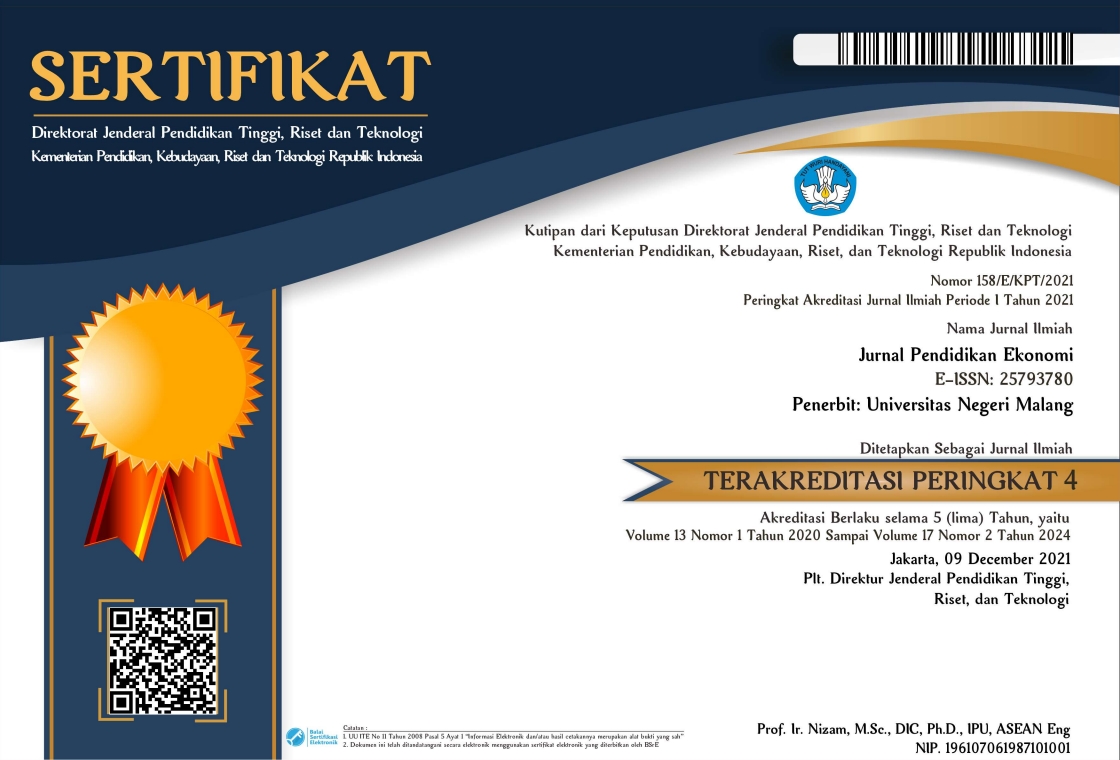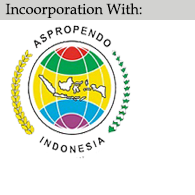Unveiling the Determinants of Financial Satisfaction among Civil Servants in Indonesia
Abstract
This study aims to ascertain the determinants of financial satisfaction among the state civil apparatus in Indonesia, including financial literacy and income. This study also examines the role of financial behavior in mediating the relationship between variables. This present study used a quantitative method with structural equation modeling. A Likert scale was used as the measurement in the quantitative research approach. The data were retrieved from 106 samples of the state civil apparatus in a certain area in Indonesia. The findings indicate that income can predict financial behavior and financial satisfaction. In addition, financial literacy is also recognized as prominent in predicting financial behavior and financial satisfaction. This study also confirms the role of financial behavior in mediating the linkage between financial literacy and financial satisfaction as well as the relationship between income and financial satisfaction. The findings offer implications for the government to manage financial literacy through various programs as its great role for financial satisfaction.
Keywords: financial literacy, income, financial behavior, financial satisfaction
Full Text:
PDFReferences
Aboagye, J., & Jung, J. Y. (2018). Debt holding, financial behavior, and financial satisfaction. Journal of Financial Counseling and Planning, 29(2), 208–218. https://doi.org/10.1891/1052-3073.29.2.208
Alkhawaldeh, B., Alhawamdeh, H., Al-Afeef, M., Al-Smadi, A., Almarshad, M., Fraihat, B., ... & Alaa, A. (2023). The effect of financial technology on financial performance in Jordanian SMEs: The role of financial satisfaction. Uncertain Supply Chain Management, 11(3), 1019–1030. https://doi.org/10.5267/j.uscm.2023.4.020
Ambarsari, M. D., & Asandimitra, N. (2023). Pengaruh financial literacy, lifestyle, konformitas, money attitude, dan e-money terhadap perilaku konsumtif Generasi z penggemar Korean Wave di Kota Surabaya. Jurnal Ilmu Manajemen, 2, 550–564. https://doi.org/10.26740/jim.vn.p550-564
Arifa, J. S. N., & Setiyani, R. (2020). Pengaruh pendidikan keuangan di keluarga, pendapatan, dan literasi keuangan terhadap financial management behavior melalui financial self-efficacy sebagai variabel mediasi. Economic Education Analysis Journal, 9(2), 552–568. https://doi.org/10.15294/eeaj.v9i2.39431
Asaad, C. T. (2015). Financial literacy and financial behavior: Assessing knowledge and confidence. Financial Services Review, 24(2), 101–117. https://doi.org/10.61190/fsr.v24i2.3236
Austin, J. N., & Nuryasman, M. N. (2021). Perilaku, sikap dan pengetahuan keuangan terhadap kepuasan keuangan. Jurnal Manajerial dan Kewirausahaan, 3(1), 61–71. https://doi.org/10.24912/jmk.v3i1.11288
Brounen, D., Koedijk, K. G., & Pownall, R. A. (2016). Household financial planning and savings behavior. Journal of International Money and Finance, 69, 95-107. https://doi.org/10.1016/j.jimonfin.2016.06.011
Cherkashina, T. Y. (2019). Measurement of population income: Variants of estimat ing biases. Voprosy Ekonomiki, 1, 12.
Fornell, C., & Larcker, D. F. (1981). Structural equation models with unobservable variables and measurement error: Algebra and statistics.
Ghozali, I., & Latan, H. (2012). Partial least squares: Konsep, teknik dan aplikasi menggunakan program SmartPLS 2.0 M3. Semarang: Badan Penerbit Universitas Diponegoro.
Hair Jr, J. F., Howard, M. C., & Nitzl, C. (2020). Assessing measurement model quality in PLS-SEM using confirmatory composite analysis. Journal of Business Research, 109, 101–110. https://doi.org/10.1016/j.jbusres.2019.11.069
Hardina, F. (2019). Pengaruh literasi keuangan terhadap kepuasan keuangan dengan perilaku keuangan sebagai variabel intervening pada masyarakat kota Makassar. Skripsi: Universitas Islam Negeri Alauddin Makassar.
Hartanti, I. T. (2023). Pengaruh pengetahuan keuangan, perilaku keuangan, dan pendapatan terhadap kepuasan keuangan pada karyawan bagian produksi PT Sarana Karya Utama (Doctoral dissertation, Universitas Muhammadiyah Gresik).
Hidayah, A. P. N., Purbawangsa, I. B. A., & Abundanti, N. (2021). Pengaruh literasi keuangan, perencanaan keuangan dan pendapatan terhadap kesejahteraan keuangan guru perempuan di Kota Denpasar. E-Jurnal Manajemen Universitas Udayana, 10(7), 672.
Hidayanti, F., Tubastuvi, N., Purwidianti, W., & Endratno, H. (2023). The influence of financial literacy, lifestyle, self-control, and peer conformity on student’s consumptive Behavior. International Journal of Economics, Business and Accounting Research (IJEBAR), 7(1), 14.
Iriani, A. R., Rahayu, C. W. E., & Rahmawati, C. H. T. (2021). The influence of demographic factors and financial literacy on the financial behavior. Jurnal Kajian Manajemen Bisnis, 10(1), 33–45. https://doi.org/10.24036/jkmb.11220500
Kraus, P. L. (2015). Giving Guidance When you don't have the resources of a swiss bank: Answering everyday questions that deal with financial literacy. Community & Junior College Libraries, 21(1–2), 19–26. https://doi.org/10.1080/02763915.2015.1111094
Lusardi, A., & Mitchell, O. S. (2014). The economic importance of financial literacy: Theory and evidence. American Economic Journal: Journal of Economic Literature, 52(1), 5–44. https://doi.org/10.1257/jel.52.1.5
Natsir, K., Setini, M., & Arifin, A. Z. (2020). The influence of income and financial literacy on financial satisfaction through financial behavior as a mediating variable. Urban Development and Life style, 105–115. https://doi.org/10.24912/jmieb.v7i1.22937
Ngamaba, K. H., Armitage, C., Panagioti, M., & Hodkinson, A. (2020). How closely related are financial satisfaction and subjective well-being? Systematic review and meta-analysis. Journal of Behavioral and Experimental Economics, 85, 101522. https://doi.org/10.1016/j.socec.2020.101522
Pearson, B., & Korankye, T. (2023). The association between financial literacy confidence and financial satisfaction. Review of Behavioral Finance, 15(6), 935–946. https://doi.org/10.1108/RBF-03-2022-0090
Putri, R. S. E., & Munandar, A. (2024). Kepuasan keuangan: Karakteristik sosial-ekonomi, sifat-sifat kepribadian, literasi keuangan, perilaku keuangan. Jurnal Ilmiah Manajemen, Ekonomi, & Akuntansi (MEA), 8(1), 32–55. https://doi.org/10.31955/mea.v8i1.3559
Riitsalu, L., & Murakas, R. (2019). Subjective financial knowledge, prudent behaviour and income: The predictors of financial well-being in Estonia. International Journal of Bank Marketing, 37(4), 934–950. https://doi.org/10.1108/IJBM-03-2018-0071
Rusdini, D. A. (2021). Faktor yang memengaruhi financ ial satisfaction pada masyarakat kabupaten pamekasan. Jurnal Ilmu Manajemen, 9(1), 182–190. https://doi.org/10.26740/jim.v9n1.p182-190
Sampoerno, A. E., & Asandimitra, N. (2021). Pengaruh financial literacy, income, hedonism lifestyle, self-control, dan risk tolerance terhadap financial management behavior pada generasi milenial kota Surabaya. Jurnal Ilmu Manajemen, 9(3), 1002–1014. https://doi.org/10.26740/jim.v9n3.p1002-1014
Sari, C. P., & Wiyanto, H. (2020). Pengaruh pengetahuan keuangan, perilaku keuangan, dan pendapatan terhadap kepuasan keuangan. Jurnal Manajerial dan Kewirausahaan, 2(4), 880–888. https://doi.org/10.24912/jmk.v2i4.9867
Sari, S. R., Andriani, S., & Sari, P. R. K. (2020). Pengaruh literasi keuangan dan gaya hidup terhadap perilaku keuangan Aparatur Sipil Negara (ASN) wanita di Sumbawa Besar. Jurnal Ekonomi dan Bisnis Indonesia, 5(2), 33–37. https://doi.org/10.37673/jebi.v5i02.852
Siswoyo, U., & Asandimitra, N. (2021). Pengaruh income, debt, gender differences, financial literacy, dan financial attitude terhadap financial satisfaction. Jurnal Ilmu Manajemen, 9(4), 1549–1562. https://doi.org/10.26740/jim.v9n4.p1549-1562
Spuhlera, B. K., & Dew, J. (2019). Sound financial management and happiness: Economic pressure and relationship satisfaction as mediators. Journal of Financial Counseling and Planning, 30(2), 157–174.
Stolper, O. A., & Walter, A. (2017). Financial literacy, financial advice, and financial behavior. Journal of Business Economics, 87, 581–643. https://doi.org/10.1007/s11573-017-0853-9
Susanti, D. A. (2021). The effect of financial literacy and income on personal financial management behavior of millennials in Yogyakarta, Indonesia. IEJST (Industrial Engineering Journal of the University of Sarjanawiyata Tamansiswa), 5(2), 75–82. https://doi.org/10.30738/iejst.v5i2.14642
Wahyono, H., & Narmaditya, B. S. (2022). Structural model of the application of anti-corruption values to local government bureaucrats. Social Sciences & Humanities Open, 6(1), 100346. https://doi.org/10.1016/j.ssaho.2022.100346
Wann, C. R., & Burke-Smalley, L. A. (2023). Attributes of households that engage in higher levels of family financial planning. Journal of Family and Economic Issues, 44(1), 98–113. https://doi.org/10.1007/s10834-021-09805-0
Xiao, J. J., & O'Neill, B. (2018). Propensity to plan, financial capability, and financial satisfaction. International Journal of Consumer Studies, 42(5), 501–512. https://doi.org/10.1111/ijcs.12461
Xiao, J. J., & Porto, N. (2017). Financial education and financial satisfaction: Financial literacy, behavior, and capability as mediators. International Journal of Bank Marketing, 35(5), 805–817. https://doi.org/10.1108/IJBM-01-2016-0009
Xiao, J. J., & Tao, C. (2021). Consumer finance/household finance: the definition and scope. China Finance Review International, 11(1), 1–25. https://doi.org/10.1108/CFRI-04-2020-0032
Xiao, J. J., Chen, C., & Chen, F. (2014). Consumer financial capability and financial satisfaction. Social Indicators Research, 118, 415–432. https://doi.org/10.1007/s11205-013-0414-8
Yulianingrum, A., Rianto, M. R., & Handayani, M. (2021). Pengaruh pengetahuan keuangan, pendapatan dan perilaku keuangan terdahap kepuasan keuangan pada tenaga harian lepas satpol pp di kabupaten (X). Jurnal Ilmiah Akuntansi dan Manajemen, 17(1), 71–77. https://doi.org/10.31599/jiam.v17i1.582
DOI: http://dx.doi.org/10.17977/UM014v17i2p113
Refbacks
- There are currently no refbacks.

Jurnal Penddidikan Ekonomi is licensed under a Creative Commons Attribution-NonCommercial-ShareAlike 4.0 International License





